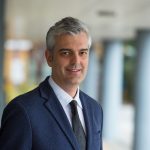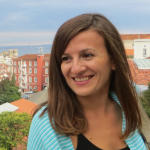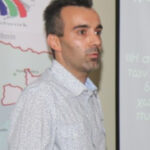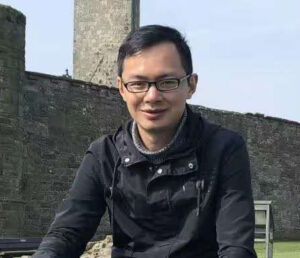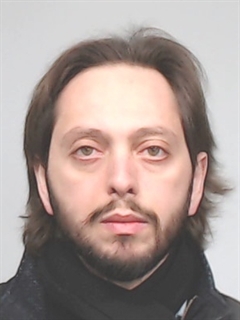SDGs supported:


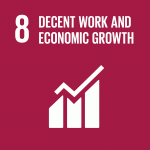
.
.
Prof Stergios-Aristoteles Mitoulis, PhD, DiplEng, MSc, CEng MICE, M.ASCE, M.EAEE, FHEA, Head of Structures, Professor, University of Birmingham
Associate Professor, Univesity College London, The Bartlett School of Sustainable Construction
Professor of Structure and Infrastructure Engineering, University of Birmingham
Scopus ORCiD GoogleScholar LinkedIn ResearchGate
Stergios is the leader of the MetaInfrastructure and bridgeUkraine initiatives. Stergios has a sustained record of grant-winning with more than £8.1 million of funding which he received by the UKRI and Horizon Europe, the British Academy, charities and industry. He led and won recently a € 1.65 million MSCA-SE-2021, the ReCharged project, leads a part of the € 5 million HORIZON-CL5-2023-D4-01-01 ZEBAI project and leads the Pilots of the a € 2.5 million HORIZON-MISS-2021-CLIMA-02 the RISKADAPT project. He is the Editor in Chief of the ICE Journal of Bridge Engineering.
Stergios’ expertise is in climate resilience, sustainability, and digitalisation of critical infrastructures. During his academic career he has supervised more than 20 doctoral and postdoctoral researchers. He has published extensively with a publication record exceeding 200 papers in leading scientific journals and conferences. He is known for his expertise in bridges.
He is a member of the BSI B/525/10 CEN/TC250/HG-Bridges, the BSI Mirror Group of Eurocodes, and UK delegate of the BSI (CEN/TC250/SC8 Work Group 6, Bridges) for the design and retrofit of bridges, the BSI committee B/525/8 and B/538/5, the Workgroup 11 of the EAEE and the IABSE TG1.8. He has editorial and reviewing responsibilities for more than 50 reputed journals. He has served as an evaluator for EU proposals and research grants from the UK (EPSRC), Canada, and others. He delivers seminars at consultancies and also participates in CPD activities as an official lecturer of the Institution of Civil Engineers in the UK. He has an extensive presence in the news of leading news agencies, including the BBC.
.
Dr Sotirios A. Argyroudis, PhD, DiplEng, BSc, CEng MICE, FHEA
Associate Professor (Reader) at Brunel University London
Scopus ORCiD GoogleScholar ResearchGate Linkedin
Sotirios holds two degrees, in Civil Engineering (MEng) and Geology (BSc), and a PhD in Geotechnical Earthquake Engineering. He is the Deputy Scientific Coordinator of the Horizon/UKRI ReCharged project. He co-founded the www.bridgeUkraine.org and co-leads the www.metaInfrastructure.org. He has over 20 years of research experience in the field of geotechnical and infrastructure engineering, with focus on the risk and resilience analysis of infrastructure due to geo-hazards (earthquake, flood/scour, landslides, tsunamis). In 2017 he was awarded a H2020 Marie Skłodowska-Curie Individual Fellowship (TRANSRISK project, 2017). He has more than 120 reports and publications in scientific journals, conference proceedings and book chapters and participated in 15+ research projects. He acted as a reviewer for more than 25 scientific journals and for research proposals. He is Vice-Chair of the IABSE Task Group 1.8 on ‘Design requirements for infrastructure resilience’, member of the EAEE Working Group 13 on ‘Seismic assessment, design and resilience of industrial facilities’ and Nominated member (UK) of the ISSMGE (International Society for Soil Mechanics and Geotechnical Engineering) Technical Committee TC202 on Transportation Geotechnics. He supervised several UG, MSc and PhD research students, and he delivers seminars and participates in CPD activities. He is associate editor in ICE Journal of Bridge Engineering and member of the Editorial Board in Sustainability (Section board for ‘Hazards and Sustainability’). Sotirios is listed at Stanford’s top 2% most highly cited scientists in 2021 and 2022.
 Nadiia Kopiika, Research Fellow, British Academy/CARA
Nadiia Kopiika, Research Fellow, British Academy/CARA
Scopus, Linkedin , GoogleScholar , ORCID, ResearchGate, WebOfScience
Nadiia is a Research Fellow, sponsored by the British Academy/CARA. She holds an MSc in Building and Civil Engineering, Lviv Polytechnic National University. Her PhD research focused on probabilistic methods for the calculation of corroded reinforced concrete beams capacity. Nadiia has expertise in the field of reinforced concrete (RC) structures, their strength and reliability. Her experimental and theoretical investigations include damage of RC structures, methods for their strengthening, retrofitting and possibilities of increasing their service life. The focus of her research is on material properties and probabilistic approaches for assessment of RC structures. Additionally, she studied various non-destructive methods of experimental research, including the method of Digital Image correlation (DIC). Experimental research with the use of DIC method covered various issues of RC structures reliability, including stress and strain distribution and specifics of thermally strengthened rebars. Thus, her research covers advanced areas for DIC application such as beam structures monitoring and assessment of load-bearing capacity of bridge structures. Nadiia’s skills include knowledge of construction and engineering software, surveying equipment, calculation and design techniques, laboratory work, experiment planning and organization, experimental data processing and analysis with the use of specific programs and equipment.
.
 Dr Nataliya Shakhovska, Sc. Dr., Ph.D., Full Professor
Dr Nataliya Shakhovska, Sc. Dr., Ph.D., Full Professor
Head of the Department of Artificial Intelligence, Lviv Polytechnic National University
Scopus GoogleScholar ResearchGate ORCID Linkedin
Nataliya is the Head of the Department of Artificial Intelligence in Lviv Polytechnic National University, Ukraine. Her current research interests include NLP, Big Data processing, Database and datawarehouse integration, distributed systems, integrated systems and dataspaces. She has published more than 300 scientific papers, 5 monographs, 6 textbooks and is an active member of the editorial board of seven scientific journals in Ukraine and abroad. Technical Leader of several information systems embedded in Lviv Polytechnic and other corporations in Ukraine. She has supervised 9 PhD dissertations.
Dr Marianna Loli, PhD, DiplEng, MSc
Project coordinator Grid-Engineers & Associate at Innovation Center on Natural Hazards & Infrastructure (ICONHIC), former Marie-Curie Research Fellow
Scopus GoogleScholar ResearchGate Linkedin
Marianna is the research projects coordinator and senior consultant at Grid-Advisors. Her research couples novel simulation tools with state-of-the-art physical modelling techniques for the assessment of geohazard effects and the effective protection of critical infrastructure. She is the co-author of 13 papers in international refereed journals and over 30 publications in conference proceedings. Marianna has participated in 10+ major European research projects stepping-up her career ladder by undertaking duties as a researcher, senior investigator and recently as a principal investigator. In parallel with her doctoral and post-doctoral research activity, she has been involved as junior and senior engineer in seven consulting projects involving geotechnical and earthquake engineering, vulnerability and seismic risk assessment and resilience-based design of various types of infrastructure. Just recently she was awarded a H2020 Marie Skłodowska-Curie Individual Fellowship (ReBounce project, 2020) aiming to develop an integrated risk and resilience assessment framework for flood-critical bridges and the associated transport networks. She participates in the Innovation Center on Natural Hazards & Infrastructure and is a member of the organizing committee of the International Conference on Natural Hazards & Infrastructure ICONHIC.
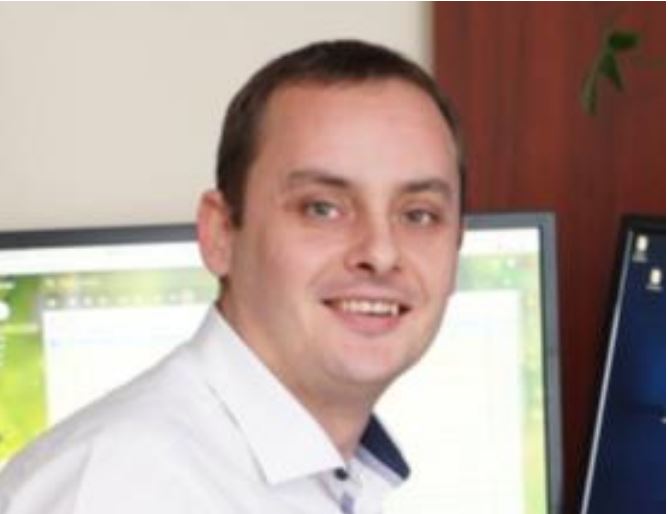 Dr Ivan Izonin, Associate Professor of AI, Lviv Polytechnic National University, Ukraine, Senior Member IEEE, Member ACM & Member INNS
Dr Ivan Izonin, Associate Professor of AI, Lviv Polytechnic National University, Ukraine, Senior Member IEEE, Member ACM & Member INNS
Linkedin, Scopus, Google Scholar, ORCID
Ivan is a senior member of IEEE, a member ACM & a member of INNS. He is an Associate Professor at the Department of Artificial Intelligence of Lviv Polytechnic National University, Ukraine. His main research interests are focused on the high-speed computational intelligence, neural-like structures, non-iterative training algorithms, ensemble models, meta learning and small data analysis. His work focuses on information modelling based on a new ANN design concept – Successive Geometric Transformations Model (SGTM). Neural-like structures based on the SGTM as universal approximators implement the training and self-training principles and are based on algorithmic or hardware performing variants. Ivan received his MSc degree in Computer science at Lviv Polytechnic National University in 2011 and MSc degree in Economic cybernetics at Ivan Franko National University of Lviv in 2012. He received a PhD in Artificial Intelligence at Lviv Polytechnic National University in 2016.
 Dr Raffaele Cucuzza, Marie Curie Fellow, University of Birmingham, PhD, DiplEng
Dr Raffaele Cucuzza, Marie Curie Fellow, University of Birmingham, PhD, DiplEngRaffaele won the Global Marie Curie Fellow hosted by the University of Birmingham (funding: € 430,343-commences 11/2025). He also won the Expert Talent Program (Grant amount: 300,000 Yuan) in collaboration with South East University (Chinese ranking: 1st in Civil Engineering). He is member and coordinator of the Artiste Lab at the Politecnico di Torino and Data-Centric Engineering, AI and Smart Technologies at the IRI center of South East University. Raffaele is the Associate Editor of several Elsevier and Springer Journals (ICE Journal of Bridge Engineering, Alexandria Engineering Journal, Journal of Building Pathology and Rehabilitation, Frontiers in Built Environment-Section: Sustainable Design and Construction). During his academic career, he has supervised more than 20 master’s students and 2 postdoctoral researchers. He has published extensively with a publication record exceeding 60 papers in leading scientific journals and conferences. He is known for his expertise in structural Optimization applied to the civil construction sector.
 Dr Athanasia (Nancy) K. Kazantzi, Research Fellow, University of Birmingham, UK, PhD, DiplEng, MSc
Dr Athanasia (Nancy) K. Kazantzi, Research Fellow, University of Birmingham, UK, PhD, DiplEng, MSc
Linkedin , Scopus, GoogleScholar, ORCID
Athanasia (Nancy) holds a 5-year MEng in Civil Engineering from Democritus University of Thrace (2002), an MSc with distinction in Structural Engineering from the University of Sheffield (2004) and a PhD (2008) from the University of Surrey. Following the completion of her doctoral studies, she worked as a graduate design engineer in a renowned engineering consulting firm in UK, joining the special projects and geotechnical groups, where she played an important role in the engineering and management of high-profile projects. Upon her return to Greece, she joined the Institute of Steel Structures (The λ-Lab group) at the National Technical University of Athens and participated in several national and international research projects, among others, in the fields of Earthquake Engineering, Seismic Vulnerability/Risk Assessment and Loss Estimation under Multiple Hazards, funded by a number of prestigious organisations, such as the Applied Technology Council, the Global Earthquake Model Foundation, the EU Research Executive Agency and the Hellenic General Secretariat for Research and Technology. She has several years of experience as a freelance Consultant Engineer and she worked as a Senior Risk Engineer in the research department of a Swiss company. Athanasia has also gained valuable teaching experience by leading a number of undergraduate taught modules as an adjunct lecturer at the Aristotle University of Thessaloniki, the University of Thessaly and the International Hellenic University. She is a Chartered Engineer in Greece since 2003.
.
 Dr Roberta Di Bari, Research Fellow, MSc, University of Birmingham, UK
Dr Roberta Di Bari, Research Fellow, MSc, University of Birmingham, UK
.
Roberta is a research fellow at the University of Birmingham, focusing on the sustainability of buildings and infrastructures. During her studies, in 2013, she won an Erasmus scholarship and studied at TU Braunschweig. In 2015, she completed her bachelor’s at Politecnico di Bari and graduated top class in piano from Conservatorio di Musica di Bari. In 2017, she won a scholarship and worked as a student research assistant at the University of Stuttgart. After her master’s degree at the University of Bergamo in 2018, she worked at the Department of Lifecycle Engineering (GaBi) of the University of Stuttgart. At the University of Stuttgart, she was involved in the Cluster of Excellence “Integrative Computational Design and Construction for Architecture” (IntCDC) and relevant activities on an international level, such as the International Energy Agency, Energy in Buildings Community Program (IEA EBC), Annex 72. In 2014 she submitted her PhD Thesis on predictive risk integrated lifecycle analyses and integration in computational design. In April 2024, she joined the University of Birmingham and the MetaInfrastructure group. Her research focuses on uncertainties and risk assessment integration in Life Cycle Assessment (LCA). Furthermore, she works in the field of digitalisation in LCA and the technical development of tools for evaluating environmental sustainability in the construction sector.
.
Dr Khrystyna Myroniuk, Associate Professor, Lviv Polytechnic National University, Ukraine
GoogleScholar , ORCID, Scopus, ResearchGate
Khrystyna is an associate professor in Heat, Gas Supply and Ventilation Department at Lviv Polytechnic National University. She defended her PhD thesis with the title: Increase air distribution efficiency with interaction of opposed non-coaxial air jets at Kyiv National University of construction and architecture in 2010. She works in the field of Heating, Ventilation, and Air Conditioning (HVAC). Her research and teaching interests are connected with providing microclimate parameters and using heating systems in different buildings, energy-saving technologies in residential complexes, providing the microclimate parameters and using combined heating systems in industrial buildings, standards related to energy efficiency in buildings; and introduction of environmentally friendly technologies in the construction industry. Khrystyna is engaged in revising Ukrainian standards and bringing them to European standards. She conducts lectures, training courses and intensive courses concerning European norms to ensure the microclimate parameters in energy-saving buildings, European standards of engineering calculation of heating, ventilation and air conditioning systems in residential houses, resource-saving technologies and the use of secondary and low potential resources of energy in the systems of ensuring the microclimate. She also is the Executive Secretary of the Scientific Journal “Theory and Building Practice”, which is a professional and indexed database, Copernicus.
.

Dr Shchasiana Arhun, Doctor of Engineering Sciences, Professor, Kharkiv National Automobile and Highway University, Teaching Fellow at the University of Birmingham
LinkedIn Profile, ResearchGate, Google Scholar, Orcid, Scopus
Dr. Shchasiana Arhun is a Ukrainian engineer, researcher, and academic with over 15 years of experience in engineering education, sustainable transport systems, and energy-efficient technologies in mobility. She specializes in renewable energy integration in transport, vibration diagnostics of electric machines, and infrastructure resilience. Her work focuses on advancing sustainable, low-emission, and intelligent mobility solutions by optimizing energy efficiency in electric propulsion systems and developing methodologies for monitoring and improving transport infrastructure. She has played a key role in developing next-generation curricula for electric vehicle technologies, energy-saving solutions, and intelligent transport systems. Shchasiana’s work focuses on making transport systems more sustainable, efficient, and adaptable to climate challenges. She researches ways to improve the reliability of electric vehicle powertrains and ensure the long-term success of electrified transport networks. She has worked on several international academic collaborations, including the Erasmus+ CybPhys and DIGITRANS projects, where she contributed to the development and implementation of master’s curricula in Computerized Control of Electrical Technologies and Electric Vehicles and Energy-Saving Technologies. As part of the Empower Ukraine initiative, Shchasiana is committed to developing Eurocodes-based training programs to support engineers in rebuilding Ukraine’s infrastructure, enhancing digital learning resources for engineers online knowledge-sharing platforms, mentoring and supervising students to foster a new generation of professionals skilled in sustainable infrastructure development, and strengthening industry-academic collaborations to align engineering education with real-world needs. Her long-term vision is to create a resilient and energy-efficient transport ecosystem in Ukraine, ensuring sustainable recovery and technical innovation.
 Dariia Berestok Project manager, University of Birmingham
Dariia Berestok Project manager, University of Birmingham
Dariia is the Project Manager for the Empower Ukraine project, aiming to develop a Massive Open Online Course that enhances accessibility for Ukrainian Professional Engineering Bodies. She maintains liaison with the Ministry of Restoration, fosters new collaborations, organizes workshops, and actively seeks support to strengthen the project’s impact. Additionally, she manages social media and outreach activities to enhance engagement and visibility. Dariia joined the University of Birmingham in 2023, initially working in the HR Operations department. She holds an MA in International Relations from Odesa National University and has a strong professional background in Human Resources and Project Management. Over the years, she has successfully led various HR projects focused on process excellence, change management, and roadmapping new initiatives within global organizations. These projects involved multiple stakeholders, business units, and cross-functional teams, always prioritizing alignment, cost efficiency, and sustainability. With a passion for driving meaningful change, Dariia has acted as a change agent in both regional and global transformation initiatives, working alongside international teams and Ukrainian governmental structures to support impactful and sustainable progress.
María Montiel Durá Aras, Doctoral Researcher, DegreeEng., MBA
María Montiel is a doctoral student in the PhD Program in Transportation Infrastructures and Territory at Universitat Politècnica de Valéncia (Spain), holds an MBA Master in Business Administration and Degree in Technical Civil Engineer specialty in Civil Construction and Urban Transports and Services.
She has an extensive professional career with more than 20 years of experience in the world of Construction as Construction Manager and Senior Construction Manager in the international company Acciona, S.A. She has actively participated in relevant works such as The City of Arts and Sciencies, Underground Line 5 of Valencia city, the Rehabilitation of the Colon Market or the tender for the Canfranc Station in Spain. Related to her doctorate, she analyzes the effect of bridges on the origin and potential urban development of cities, especially in the city of Valencia, which has allowed her to participate in some conferences and publish articles about it. Currently, she is carrying out her research as a visitor at the School of Civil Engineering in the University of Birmingham.
 Dr Eleonora Perugini, PhD, MSc, CEng(Italy)
Dr Eleonora Perugini, PhD, MSc, CEng(Italy)
Senior Researcher in monitoring for Risk Assessment, University of Birmingham, Former Marie-Curie Research Fellow
Eleonora is a Senior Researcher in Monitoring for Risk Assessment at the University of Birmingham. Her research focuses on hydraulic monitoring and modelling for risk assessment of bridges under scour and hydraulic hazards. Her work aims to increase the resilience of infrastructures and local communities under natural hazards. Eleonora received her MSc degree in Civil and Environmental Engineering at the Università Politecnica delle Marche, Italy. She held a PhD in Civil Engineering regarding coastal monitoring and nearshore morpho-dynamics. During her PhD, Eleonora was a visitor researcher at the US Naval Research Laboratory, Mississippi. In 2022 she was awarded a H2020 Marie Skłodowska Curie Individual Fellowship (RAMOBRIS) aiming to investigate advanced modelling and risk assessment strategies for critical bridges. Recently, Eleonora has participated in MEDIATE European Research Project working on the identification of extreme events and multi-hazard analysis.
Dr Stavros P. Sakellariou, PhD, MSc, DiplEng,
Postdoctoral Research Fellow (Marie-Curie) at Brunel University London, UK
Scopus ORCiD GoogleScholar ResearchGate Linkedin
Stavros holds a degree in Spatial Planning and Regional Development (MEng), a MSc in Spatial Planning & Development, a MSc in Geospatial Technologies (Erasmus Mundus – Joint degree) and a PhD in Spatial Decision Support Systems (SDSS) for Prevention and Management of Wildfires. He has conducted a 3-year postdoctoral research studying the exposure and effects of wildfires on natural / anthropogenic ecosystems and critical infrastructures. Stavros has 6.5 years postdoctoral research experience as Senior Researcher. During this period, he worked in 8 multi-partner research projects dealing with natural disasters, spatial planning, forest fires and environmental management. In the same context, he has 4 years pre-doctoral research experience as Early-Stage Researcher in the same fields. The Fellow has taught for 6 years in Master of Science Programs, and 5.5 years in Undergraduate Programs at the University of Thessaly and the Aristotle University of Thessaloniki as Adjunct Assistant Professor. Stavros has 30 publications in international scientific journals, 45 publications in conference proceedings and 2 book chapters. He’s been an invited speaker in national and international universities and conferences dealing with the integration of geoinformatics to wildfires management. He has earned 7 national/international scholarships and awards. He acted as a reviewer for more than 15 scientific journals, while he has served as a Lead Guest Editor in 2 special issues relative to natural disasters and wildfires. He has been awarded a UKRI/HORIZON Marie Skłodowska-Curie Postdoctoral Fellowship (FIREWISE project, 2024) aiming to establish an integrated framework for proactive wildfire resilience assessment and management.
.
Dr Jinsheng Wang, PhD, MSc, BEng
Postdoctoral Researcher, University of Birmingham, UK
Jinsheng holds a PhD from the Zienkiewicz Centre for Computational Engineering (ZCCE) in Swansea University (UK) since 2020. His expertised focuses on the structural reliability analysis and uncertainty quantification of civil engineering structures. Jinsheng has more than 10 years of research experience in the field of civil and infrastructure engineering, with focus on uncertainty quantification, reliability and vulnerability assessment of engineering structures when exposed to natural hazards. In 2015 he obtained an MSc degree in Bridge and Tunnel Engineering from the Central South University (China), and he was awarded the first-class scholarship (10%). His master thesis entitled Research on Optimal Design and Mechanical Properties of RPC Slab Track explored the application of Reactive Powder Concrete (RPC) in high-speed railway and set the ground for a novel slab design concept, resulting in two patents and four publications. His specialisation in transport engineering was initiated and strengthened, during his 4-year studies (2008–2012) that led to a diploma in Civil Engineering from Nanchang University (China). Jinsheng has participated in 11 national and European research projects stepping-up his career ladder by undertaking duties as a research assistant, researcher, and recently as a co-principal investigator, involving a wide range of infrastructure assets (e.g., buildings and bridges) exposed to natural and human-induced hazards.
.
 Morgan Breen, doctoral researcher, BSc in Geography, Brunel University of London
Morgan Breen, doctoral researcher, BSc in Geography, Brunel University of London
Morgan holds a BSc degree and is currently pursuing a PhD focusing on the socio-hydrological dynamics and unintended consequences of structural coastal flood protection in the UK. With a keen interest in flood risk management and geospatial analysis, his research integrates agent-based modelling and longitudinal analysis to inform policy and enhance community resilience against flooding. Morgan has been involved in the ReCharged research project and has contributed to creation of a geodatabase of at-risk interdependent critical transport and energy systems. His work emphasizes the importance of communication strategies and interdisciplinary approaches in effective flood risk management. Morgan actively participates in academic seminars and workshops, sharing insights on innovative flood management strategies and promoting resilience within vulnerable communities.

John Adah Agbo, Quantity surveyor, BTech, MSc
Doctoral Researcher, University of Birmingham, UK
John holds an MSc in construction project and cost management from Coventry University, UK. He has professional experience in construction of infrastructures, and in particular costing projects and the facilities management of built assets during its lifecycle. John’s research focuses on the optimisation of climate-resilience and sustainability in critical transport infrastructure. The main scope of this PhD is to process openly available digital data from e.g., UAV-enabled mapping, GIS, satellite imagery and/or forensic evidence to develop optimised resilience and sustainability solutions for assets, such as bridges or other critical infrastructure.
.
 Francesco Pentassuglia, Structural Engineer, MEng, MSc
Francesco Pentassuglia, Structural Engineer, MEng, MSc
Doctoral Researcher, University of Birmingham, UK
Francesco holds an MSc in Structural Engineering from Surrey University, UK. His MSc dissertation focused on studying the similarities between seismic and robustness design and the influence that seismic design principles and rules could have on the robustness and resilience structures. The project was awarded the RC Vaughan Prize for Best Student Project in Structural Engineering in terms of content and potential impact. He has professional experience on construction and consulting in engineering, in particular focusing on performing structural calculations using FE analysis software on medium to high rise building structures. He also gained on the field experience assessing damage of buildings after fire or flood events and installing equipment on site such as remote control monitoring. Francesco’s research is focused on resilience-based management of transport infrastructure enhanced by digital data and Artifical Intelligence (AI). The main scope of this research is to update advanced FE models based on data obtained from disparate sources e.g. digital twins, point clouds and/or other forensic evidence, obtained for example from inspections, to improve the predictive capacity of models of transport assets and/or networks, such as bridges, roads and/or railways in support of resilience-based decision making.
.
 Henrry Vicente Rojas Asuero, PhD (c), Pontificia Universidad Católica de Chile, MSc, Civil Engineering
Henrry Vicente Rojas Asuero, PhD (c), Pontificia Universidad Católica de Chile, MSc, Civil Engineering
Henrry Vicente Rojas Asuero is a PhD candidate at Pontificia Universidad Católica de Chile, specializing in seismic vulnerability assessment of bridges. Currently, he interns at the University of Birmingham, focusing on clustering techniques to categorize bridge typologies for regional risk assessment. He holds a Master’s in Civil Engineering Systems from Universidad Politécnica de Madrid and a Bachelor’s in Civil Engineering from Universidad Técnica Particular de Loja (UTPL), Ecuador.Henrry has worked on multidisciplinary research projects in Ecuador and Chile, addressing seismic risk and structural analysis, including seismic monitoring networks.Additionally, he founded “Ingeniería con Henrry,” an Instagram platform with over 97,000 followers, where he shares insights on civil engineering and risk mitigation.
 Mohammed Almousa, architect, urban planner, BSc, MSc,
Mohammed Almousa, architect, urban planner, BSc, MSc,
Doctoral Researcher, University of Birmingham, UK
Mohammed is a lecturer in the Department of Urban Planning at King Saud University and is currently pursuing a Ph.D. degree. He holds a Bachelor’s degree in Architecture and Building Science (BSc) from 2014 and a Master’s degree in Urban Planning and Design (MUPD) from Monash University, completed in 2022. Mohammed’s research focuses on the integration of micro-mobility within public transportation systems in Riyadh. His Ph.D. research, fully funded by the Saudi Arabian Cultural Mission, centers around enhancing micro-mobility infrastructure and reducing the first and last-mile challenges. Through his work, Mohammed aims to contribute valuable insights to the field of urban planning and develop sustainable solutions for efficient transportation systems in urban areas.
 Seyyed Mohammad Hosseini, MSc in Structural Engineering, EPSRC Doctoral Researcher at Brunel University of London
Seyyed Mohammad Hosseini, MSc in Structural Engineering, EPSRC Doctoral Researcher at Brunel University of London
Seyyed Mohammad Hosseini is an EPSRC Doctoral Researcher at Brunel University of London, specializing in structural and geotechnical engineering with expertise in modelling and analysis. Currently pursuing his PhD, he focuses on “Enhancing Infrastructure Resilience: Integrating Lifecycle Analysis for Climate-Adaptive Restoration”. His research aims to develop resilient and sustainable approaches to protect transport infrastructure against climate challenges, addressing the critical need for stronger infrastructure in the face of growing hazards and uncertainties. This involves integrating lifecycle analysis, open-data and a holistic resilience framework.
Seyyed holds a Master’s degree in Structural Engineering from Brunel University London, where his research focused on a parametric study of the bond-slip behaviour in FRP-concrete connections. He also holds a Bachelor’s degree in Civil Engineering from the Islamic Azad University (IAU), Iran.
 Dr Jelena Ninic, PhD, DiplEng, MSc
Dr Jelena Ninic, PhD, DiplEng, MSc
Associate Professor at University Birmingham
Scopus ORCID GoogleScholar Linkedin
Jelena published more than 70 research papers, including over 33 articles in high-impact international journals. She has received several awards including the “Zerna” prize for her outstanding PhD thesis in 2015, and three the best paper awards. JN (co)organised three international conferences (EG-ICE 2017, CTTU 2020 and UKACM 2022). She is associate editor of “Tunnelling and Underground Space Technology” (TUST), a high-impact journal in the field, core member of ISSMGE TC222 for Geotechnical BIM and Digital Twins and UKACM EC member. She led three research projects (SATBIM: MCIF / 702874, N2N: EID ITN/765472, OptiMacs: EID ITN/764650) totalling around €2m. JN has (co-) supervised seven PhDs to completion and is currently involved in the supervision of 8 PhD students in the area of structural and geotechnical engineering.
Her current research focus is on the development and implementation of computational methods and tools to combine advanced numerical methods with novel information technologies to study structural and geotechnical problems.
FORMER MEMBERS
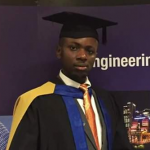 Ebo Emmanuel Kelechi, Civil Engineer, BEng, MSc
Ebo Emmanuel Kelechi, Civil Engineer, BEng, MSc
Emmanuel holds an MSc in Civil and Structural Engineering from Coventry University, UK and he has experience on construction, consulting in engineering and in particular for the design, construction and maintenance of infrastructure assets. Emmanuel’s research is focused on the risk and resilience assessment of transport hubs and networks, considering their interoperability when exposed to multiple hazards.
Dr Konstantinos (Dinos) Bakalis, PhD, DiplEng, MSc
Linkedin , Scopus, GoogleScholar
Konstantinos (Dinos) holds a degree in Civil Engineering from Aristotle University of Thessaloniki (2010) and an MSc with merit in Earthquake Engineering with Disaster Management from University College London (2011). His research is focused on the seismic risk assessment of steel structures and community critical industrial facilities (e.g., refineries).
.
 Dr Sotiria Stefanidou, PhD, DiplEng, MSc
Dr Sotiria Stefanidou, PhD, DiplEng, MSc
Senior Researcher, Aristotle University & Institute of Engineering Seismology Earthquake Engineering, Greece, Adjunct Lecturer at International Hellenic University.
Scopus GoogleScholar ORCiD ResearchGate Linkedin
Sotiria is Research Associate at the Institute of Engineering Seismology & Earthquake Engineering and Postdoctoral Researcher at the Civil Engineering Department, Aristotle Univ. of Thessaloniki (AUTh) in the field of Structural Dynamics and Earthquake Engineering. She is Adjunct Lecturer at International Hellenic Univ. and Affiliate Scientific Staff at AUTh. She received her PhD with Distinction in 2016 in fragility analysis of bridges (AUTh) and holds two MSc degrees in Earthquake Engineering (2007) and Natural disasters & climate change (2019). She has more than 35 publications in international referred journals, conferences and books and has participated in 10 Research Projects. Sotiria works as Freelancer chartered civil engineer (Greek Institution of Civil Engineers, Greece) since 2006.
Dimitra has research experience on shear transfer mechanisms, interfaces of concrete elements, strengthening with composites (FRPs) and damage detection and characterisation with guided waves. She has worked a total of 10 years in research in the areas of strengthening and monitoring of structures. Dr Achillopoulou has worked as a researcher and PI in three research projects relevant to structural health monitoring with guided waves. In 2019 she was awarded a H2020 Marie Skłodowska-Curie Individual Fellowship (BriFace project, 2019) on the resilience assessment of bridge retrofitting measures based on interface efficiency indices using novel guided wave-banded monitoring methods.


